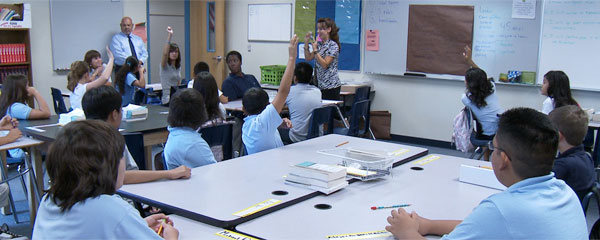 VIEW LARGER Lauffer Middle School
VIEW LARGER Lauffer Middle School
Listen:
By Zac Baker For AZPM
Insufficient state funding of public education is worsening teacher shortages and pushing educators out of Arizona’s public schools, educational experts say.
One recent survey showed that one-fourth of teachers in the state plan to leave the profession in the next five years, said Marian Salzman, executive chair at Tucson Values Teachers. Salzman also said there are several hundred open teaching positions in Arizona schools.
Nic Clement, former superintendent of Flowing Wells Unified School District in Tucson, said turnover rates are acute in Southern Arizona.
One factor is the University of Arizona, which brings couples here for graduate school. While one spouse studies for a few years the other teaches, but the couple often moves away after finishing school.
But the big driver of turnover in Arizona is low starting salaries for teachers, Clement said.
The average starting pay for a teacher in Arizona was just under $32,000 in 2013, according to the National Education Association. The national average that year was just over $36,000, with teachers in some states starting in the low $40,000s.
“You’ve got to attract the best before you can hire the best,” Clement said. “And in every profession one of the ways you attract the best is you have competitive salaries that are fair.”
In the classroom, financial matters continue to have effects on teachers, said Lisa Kist, a science teacher at Gridley Middle School in Tucson.
“I still put over $1,000 a year into my classroom,” Kist said. “Right now I can’t even get a laminator at the school. So I’m expected to buy my own posters and that kind of stuff, but I can’t protect my investment because I can’t get a laminator.”
She said that she and her family spend time on weekends working at the school to make sure she is teaching on the level she strives for.
Kist also said many required professional development courses are not paid for by school districts, with teachers paying out of pocket. Compared with other careers that require certification renewal, Kist said teachers are not “paid or treated anywhere near how these other professions are treated.”
Kist, who has been teaching six years, said money is not what keeps her in the classroom. Rather, it is watching students grasp new scientific concepts and enjoy the experience. However, she does not fault teachers who waver and knows that the paychecks are essential.
“Salary is important,” she said. “To have the feeling that people see us as professionals and not just glorified babysitters is important.”
Beyond a feeling of validation, Salzman said most teacher salaries in Arizona do not allow teachers “to even lead a middle-class life.”
Andrew Morrill, president of the teacher advocacy organization the Arizona Teachers Association, said educators call him frequently explaining that they do not want to leave teaching, but that they have no choice because they cannot pay their bills on a teacher’s income.
Several people said the fix is higher salaries, obtainable by raising taxes to boost the state education budget and teacher pay.
In his January budget proposal to the Legislature, Gov. Doug Ducey called for cuts to education spending, and he said no to any tax increases.
“It’s all well and good to talk about no taxes, but Arizona is a low-tax state,” Morrill said. “The results are that our students are footing the bill, and we can’t keep teachers in our classrooms.”
Salzman pointed to a well-funded state education as an economic safeguard, and that a tax increase for educational purposes will protect Arizona.
“I think we need to make people realize that a small tax increase, a tiny tax increase, would make all the difference in the world for these people who are effectively protecting our communities from economic recession, from economic discord,” she said.
Areas with high-quality public education have higher property values and attract employers, as well as training students for their futures, Salzman said
Clement said doing more with less does not work.
“If you want change, if you want schools to evolve, it’s not going to happen magically without an investment,” he said. “I don’t know of many innovations that happen without some kind of front-end investment.”
Morrill said that the key to achieving the changes lies with voters. Arizonans need to push their legislators to prioritize education funding and vote for people and projects that will help public schools.

By submitting your comments, you hereby give AZPM the right to post your comments and potentially use them in any other form of media operated by this institution.